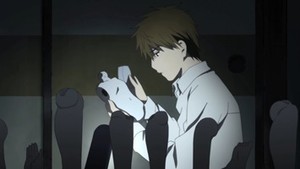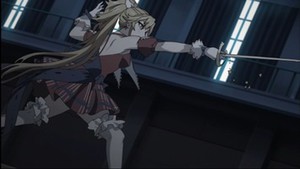The Summer 2013 Anime Preview Guide
Carl Kimlinger
Look! There, on that La-Z-Boy in the sky! Is it a bird? A plane? A callously catapulted senior citizen? No! It's Anime Reviewer Man! When ordinary citizen Carl Kimlinger doffs his pants and sits in his recliner of power, he becomes the mighty Anime Reviewer Man: champion of good anime, enemy of bad! With his righteous word processor he smites the anime he doesn't happen to like and praises the stuff that he just happens to enjoy! Beware, shoddy harem comedies! Rest easy, shameless tear-jerkers and anything that can disarm his critical faculties with eye candy! Anime Reviewer Man is on the job!

Fate/kaleid liner Prisma Illya
Rating: 2
Review: Of all the magical girl candy sprinkled about this season, Prisma Illya is by far the least substantial. Unlike the unpleasant Day Break Illusion or even the sci-fi inflected Fantasista Doll, Prisma Illya is an extremely traditional magical girl romp. This despite its very un-magical-girlish roots in Type-Moon's very adult Fate games. Fans of the Fate franchise will remember Illyasviel von Einzbern as the aristocratic young master of the terrifying Berserker. In Prisma Illya she's just a normal, or seemingly normal, girl who lives in Japan with her adopted family and loves anime and her stepbrother Shiro. After a particularly grueling night of anime-cramming, while taking a bath, she makes an idle wish for magical powers. Elsewhere, Rin and Luviagelita, two magical girls from abroad, are having a grudge match high in the air. Sick of the pair's constant in-fighting, their magical wands—Ruby and Sapphire—give them the boot and head off to look for new masters. Unfortunately for Illya, her idle wish catches the attention of Ruby.
The view of magical wands as capricious beings with warped personalities and agendas of their own is probably Prisma Illya’s one claim to innovation. The scene where Ruby and Sapphire unilaterally decide to dump Rin and her rival, flying off into the night and leaving their former masters to literally plummet into the drink, is genuinely unexpected (and because of it, also funny). Unfortunately, it's basically alone in a series that's a pastel-pretty pastiche of every magical girl trope in the fossil record. From its mildly naughty transformation sequence to its innocently happy lead and her little-girl crush on an older boy, the series is hopelessly, dully mired in the expected mahō shōjo pabulum. Fate fans can look forward to spotting characters and references from their favorite Fate arcs; loli fans can look forward to plenty of naked Illya. Everyone else can look forward to devising magical-girl drinking games. When the best friend/rival gets chosen by Sapphire, everyone slug down a fifth of Jack and pass out. You'll be glad you did.
Fate/kaleid liner Prisma Illya is available streaming at Crunchyroll.
 Gatchaman Crowds
Gatchaman Crowds
Rating: 3 ½
Review: The mantle (or winged cape) of this classic sentai franchise can't sit lightly on director Kenji Nakamura's shoulders, but he certainly makes it look as if it does. His Gatchaman is a colorful eruption of cartoon energy, a triumph of offbeat characterization and gorgeously odd art design over an essentially staid sentai narrative. Inasmuch as it features extraterrestrial menaces and a secret team of evil-busting warriors, Gatchaman Crowds has the same basic setup as its fabled progenitor. But that's about as far as the similarities go. Rather than a serious male lead, Crowds follows Hajime Ichinose, an unflappably upbeat airhead with a fetish for organizers (as in notebooks). She's a died-in-the-wool weirdo, so happily oblivious to mood and situation that she's wholly unfazed—indeed giddily happy—when an ancient vampire pulls a magical (or super-science-fictiony) notebook from her ample bosom and makes her a member of the legendary Gatchaman team. From there it's onto the obligatory underground base, where Hajime wholly ignores the somber advice of her elders and takes to superheroing like a slightly insane child to a dangerous new toy.
Ichinose is one of Nakamura's two most important additions to this sentai tale. Enormously cute, indefatigably energetic, and more than a little mad, she's a huge and often funny influence on the series. Her presence alone—as irreverent, irrepressible, and immune to propriety as that slightly insane child—is enough to shock life into the show's moribund sentai tropes, her blithe enthusiasm for every ridiculous quirk of the Garchaman world (panda aliens! robo-suits!) giving the wink to the series’ own old-school conceits. Nakamura's second addition is his peculiar pop-art sensibility: a deep love of artful flatness and purposeful simplification coupled with a riotous palette, pointedly unreal set design, and recurrent touches of surrealism—the primary being the Rubix-cube aliens that Hajime must fight. It's hard to see his Gatchaman having a terribly interesting future—thus the lukewarm grade—but it deserves a look, if only for taking its own eccentric path to action entertainment.
Gatchaman Crowds is available streaming at Crunchyroll.

Rozen Maiden – Zurückspulen Episode 2
Rating: 4
Review: Episode one was a recap of Rozen Maiden’s original universe, so this episode counts as the Zurückspulen universe's first. And it's an eye-opening beginning. Episode one hinted that the series might have sharper emotional instincts and a more refined air of gothic mystery than the previous Rozen installments, but it's genuinely (and pleasantly) surprising that this alternate-world reboot is as clear an improvement as it proves to be. Rewinding to the moment Jun circles “will wind it” on that mysterious letter, we are introduced to the Jun who circles “will not wind it.” This Jun has managed to break free of his shut-in ways and enter college. But entering the real world hasn't improved his life. He feels dissociated—isolated and alone in a world that he has missed his chance to fit into. One day at his awful job he finds a creepy magazine about the Rozen Maidens. Driven by an undefined need, he subscribes and begins assembling a doll from the pieces delivered with the magazine.
The series’ love of mysterious magical nonsense is more or less unchanged, but Peach Pit and their anime adaptors use their alternate-world reset button to wrap that nonsense around an inherently more interesting story. Rather than a nasty brat dealing with his social phobias, the new Jun is a troubled young adult struggling to find direction in a life that has come unmoored. His loneliness and vague need for something more as he heads towards a future of soul-killing adult routine has a poignant familiarity, a rough edge of emotional reality that somehow sharpens the series’ magical nonsense. In concert with the show's newly honed sense of supernatural disquiet and tighter focus on the inherent eeriness of Jun's story, that edge pushes Zurückspulen ever further from otaku fan-bait towards a kind of darkly resonant modern fable. The show could still collapse of course, but unlike episode one, this episode gives us good reason to stick around until it does.
Rozen Maiden – Zurückspulen is available streaming at Crunchyroll.

Silver Spoon
Rating: 3
Review: Is Noitamina becoming anime's ambassador of Japanese agriculture? Probably not. More likely they're just trying to capitalize on the success of Moyashimon. But between the two seasons of Moyashimon and this comedic look at life in an agriculture high-school the programming block has now seen three series about agricultural science. We'll be damned experts before long. City boy Hachiken's reasons for going to Oezo Agricultural High School (AKA Ezonoo) aren't exactly pure. Mostly he just wanted to get away from home—Ezonoo was far away and had a dorm—and to get away from the pressures of the normal school system. Life at his new school turns out to be nothing like he expected however. Classes require specialized knowledge he doesn't have and his work schedule—taking care of animals, harvesting eggs, dealing with emergencies—leaves him dirty, exhausted, and starving. Of course, it has its rewards too. Like food straight from the chicken's butt. Yum!
The problem with being set up as the successor to something like Moyashimon is that there's almost zero chance that you'll be as charming. And sure enough, Hachiken and his ag-school peers have nowhere near the kooky charisma of Sawaki and his college buddies. Far worse than the cast (who are really pretty likeable), though, is the show's tone, which has a preachy educational edge that quietly sours the series’ sense of fun. Between Hachiken's preconceptions about farming and the lessons he learns about the dreams of ag students, the difficulties of agriculture, and the value of hard work, the show bears a suspicious resemblance to those wholesome American movies where some snooty city-slicker learns the joys of simple, down-home country living. On the upside, as an ex-farmboy myself, I can attest to the (oft-funny) accuracy of the show's barnyard hijinks. Calves love butting guys in the nuts, horses will chew on your head, and farmers really are acclimated to some disturbing things—death and poop being high on the list.
Silver Spoon is available streaming at Crunchyroll.

Free! Episode 2
Rating: 3 ½
Review: Kyoto Animation's swim-club series continues to strengthen it personal conflicts and build its sports-show credentials, adding a little tension and a dose of competition to its reasonably winning mixture of silly character byplay and unusual fan-service. It's not so easy these days to characterize the series as K-ON! with guys and a pool. With every passing moment Free! looks less like a clubroom character comedy and more like a straight-up swimming show—with a healthy sideline in character comedy of course.
In the dark pool at Rin's school, Haru and his longtime rival have an after-hours reunion race. Afterwards Rin is short-tempered and moody, refusing to answer the calls of his worried sister Gou. Gou tells Nagisa and Makoto her worries about her changed brother, which prompts them to try and revive Iwatobi's swim club. If they can't see Rin any other way, they'll see him at swim competitions. Surprisingly, given his avoidance of competitive swimming, Haru agrees to help them out.
The series’ easy humor persists through this episode. It continues to have fun with Haru's public nudity issues, and lets goofy Ama-chan reveal an amusing streak of intensity. But the school-life comedy seems less and less like an end unto itself and more and more like a way of fleshing out the show's swim team. That's especially true as the series starts to build up the boys (and Gou and Ama-chan) in less comedic ways. There's an informative glimpse of Makoto at home, a dark moment stolen with Rin in his dorm, and, perhaps most importantly, a look back at the event that sent Haru and Rin down their separate tracks.
If the series can keep the character-building and conflict running while maintaining its pleasantly humorous tone, it could be a pretty formidable contender. Especially once the swimming starts in earnest. KyoAni's mastery of character animation makes for lovely fan-service (aimed here at the libidos of female fans), but should make for equally lovely sports action.
Free! is available streaming at Crunchyroll.

Sunday Without God
Rating: 2
Review: Apparently if you want to signal seriousness these days, the thing to do is beat up a little girl. Nothing says “I'm serious” like kicking a girl in the stomach. It's possible that Sunday Without God could have taken its premise somewhere whimsical (if Humanity Has Declined can make a feel-good comedy out of the Apocalypse, anything is possible), but no, it wants to be dark and intense and tragic. Which is why it begins with the male lead kicking the female lead in the stomach.
How the two got in that situation takes a little explaining. Ai is our heroine, a young orphan who is her village's Gravekeeper. Ever since God abandoned the world fifteen years ago, and people stopped dying and being born, it has been the Gravekeepers’ job to bury the should-be-dead and let them rest in peace. Humpney is our hero. He walks into Ai's town and kills everyone. Why? Because, it turns out, the friendly villagers who've been raising Ai are all walking dead. Ai is angry, she attacks Humpney, Humpney kicks her in the stomach. End of explanation.
As you might guess from its beat-up-a-girl-to-show-you're-serious gambit, Sunday is a show that wants to have a big dramatic impact without putting in the work to earn it. So it has Ai bond with Humpney in the thirty seconds before his perfidy is revealed, mostly so that Ai can feel betrayed by said perfidy. It spends a minute or two with Ai's “brother” and “sister” so that when the town gets butchered Ai's agony is particularly acute. It's all terribly tragic and dramatic, and also terribly hollow and cheap. The show might still have pulled it off, though—if it had a character or relationship worth caring about. Unfortunately Ai is a boilerplate victim and Humpney a painful parody of a coldhearted bishonen. Ai's situation does raise some potentially interesting questions about Sunday’s world, but after this episode's performance, who wants to stick around for the answers?
Sunday Without God is available streaming at Crunchyroll.

Gifu Dodo Episode 2
Rating: 1
Review: It's one of the wonders of anime that, no matter how low a show goes, there's always a deeper layer of dunderheaded crappiness for it to sink to. It was hard to imagine last week that Gifu Dodo could spoil itself any further. That episode was a hilariously inept attempt to present a mythically manly version of Japanese history. It was the kind of show where you know who the great men are because they're eight feet tall and built like Greek statues, and you know who is lowly and cowardly because they're weak girly-men or warty abominations. The talk of righteousness was overbearing and the deep-laughing, mutual-drinking, manly bonhomie of Keiji and Kanetsugu a form of fiendishly effective psychological torture. The action was so preposterously over-the-top that you could only recoil in horror, and yet somehow was also dull and lame. Its treatment of women was casually misogynistic. It was minimally animated, insultingly scored, and spearheaded by characters with the emotional flexibility of totem poles.
All of which is still true. What this episode adds is a lovely extra dimension of frustrated boredom. A goodly portion of its run time is just a rehash of last episode: a reaffirmation of the drinking-under-the-moon framing story; a reiteration of the uwanariuchi's cause, rules, and purpose; even a rerun of Keiji and Kanetsugu's first meeting in battle—though from Keiji's viewpoint this time. Add in the drearily predictable “mystery” behind the uwanariuchi and, voila, you have a show that'll send you to sleep as you're throwing your TV out the window. If you really cannot live without an animated dose of Neanderthal manliness, revisit Tetsuo Hara's own Fist of the North Star. Fist was terrible, but never boring.
Gifu Dodo is available streaming at Crunchyroll.

Stella Women's Academy, High School Division Class C3
Rating: 4
Review: For a show about a club at an all-girls school, Class C3 is rather peculiar. That may be because it's made by Gainax, who don't seem to animate anything unless it's a bit peculiar, but it's also simply because the show's club is a peculiar one. After all, who expects going into a girls’ school that they'll spend their time running around a forest trying to shoot each other? Certainly not Yura Yamato, who has come to Stella Women's Academy in hopes of reinventing herself. Though bright and active (and very weird) in private, Yura always freezes up when talking to other people. She wants very badly to have the kind of rose-colored, friend-filled life that she has admired from afar, and she means to blossom like Cinderella at her classy new school. Unfortunately, old habits die hard. Salvation comes from a very strange quarter; namely the quarter that houses the C3 Club, a club devoted to airsoft survival games.
The idea of combining a candy-sweet girls’ club with mock warfare may sound like a gimmick, a sort of K-ON! meets Platoon mash-up, but that's selling Class C3 terribly short. The series takes its gimmicky premise and spins from it a sports comedy that has the bright charm and sweet sentimentality of an all-girls schoolyard trifle, the precision violence of a military actioner, and a killer sense of humor all its own. In Yura and her social awkwardness the series finds a gentle emotional core; in its airsoft battles it finds a place for Gainax's action prowess; and in its roster of happy freaks and misfits it finds a potent store of warm silliness. The show can murder with a sight gag (the encounter that introduces Yura to the club is especially deadly) and it's exceptionally fond of comically betrayed expectations, but at heart it's as soft and sweet as a marshmallow. Yura may find herself living Rambo instead of Cinderella, but she gets exactly what she's been looking for: a new life full of good friends. And us? We get a whole pile of fun.
Stella Women's Academy, High School Division Class C3 is available streaming at Crunchyroll.
 Watamote
Watamote
Rating: 3
Review: In theory a show about the life of an un-cute, unpopular girl sounds refreshingly different. Haven't we all had our fill of improbably popular normal girls (and guys)? In execution, though, the concept proves pretty hard to watch. There's a good reason why Watamote’s anti-heroine Tomoko isn't popular. She's gloomy and self-deluded and socially inept, not to mention bitter and plain. And yet somehow, despite all of her handicaps and all evidence to the contrary, she's convinced that she's reasonably popular. And she expects her popularity to skyrocket once she hits high school. After all, that's what happens in all those bishonen games that she plays. Naturally, things don't work out like that. She goes the first two months of high school without so much as talking to anyone. So she decides to beef up her popularity. With disastrous results.
Watamote is clearly aiming for comedy of discomfort, but its discomfort is constantly threatening to overpower its comedy. That's very much Tomoko's fault. Not because she's unpleasant; though the show is uncompromising when it comes to her deep, deep flaws. Rather it's because she's too sympathetic. Despite her self-deluded entitlement and sour-grapes bitterness, Tomoko is just a confused, awkward girl who wants to experience friendship and love. So the humiliation she heaps on herself ends up being more painful than it is funny. In the meantime the series mercilessly avoids any ray of hope and stomps ferociously on any fleeting happiness.
How the show proceeds from the dark—and, admittedly, at times darkly funny—place that Tomoko has carved out for herself will largely determine whether it becomes a blackly funny comedy or just an agonizing parade of humiliation. Any black comedy worth its salt is built around a core of tarnished light, and Tomoko must find that light or her show will perish. The aching sympathy of the episode's ending is a good sign—thus the tentative recommendation—but be prepared to feel really, really bad for its heroine.
Watamote is available streaming at Crunchyroll.

Dog & Scissors Episode 2
Rating: 3
Review: Ah, episode two of a mixed-bag series: that wonderful time when hope and despair vie for supremacy over our undecided hearts. Dog & Scissors begins its sophomore outing by earning the “mystery” tag that's sometimes assigned to it. Kirihime has told Kazuhito—our reincarnated-as-a-pooch hero—that they're going out to “settle a score.” Which is to say that Kirihime is about to do a little sleuthing. And some pretty clever sleuthing it is. She uses what we know about Kazuhito's killer, what he did in the café after the killing, and Kazuhito's own housing circumstances to track down the killer and fool him into revealing himself. It isn't the best of mysteries—the show doesn't give us all the pieces until Kirihime puts them together for us—but it's better than you'd expect.
Which is one reason to have hope. Unfortunately it's followed by a couple of reasons for trepidation, if not outright fear. The first is the ensuing fight—yes, action is part of the series’ hodgepodge of genres—which is pretty shoddy, though also exceedingly bizarre and about medium funny. The second is the follow-up to the post-fight emotional climax—itself pretty decent, though it does overplay its hand a bit—which has Kirihime breaking character in a most worrying manner. Nothing that happens during or after her big fight justifies her mooning over her pet dog like some shyly smitten teenager. And then there's the part where she ponders the logistics of sexual congress with a canine. It's delivered jokingly, but still: yikes.
Despite all of that, this episode tends to tip more towards hope than despair. There's the mystery angle, yes, but more importantly the show takes some time out to touch on the effect of Kazuhito's death on his loved ones. Emotionally speaking it's the most promising potential facet of Kazuhito's situation, and that the episode seems willing to embrace it (and with the end of Kirihime's fight has proven that it's willing to embrace big emotions) is real reason to hope.
Dog & Scissors is available streaming at Crunchyroll.
Blood Lad

Rating: 3 ½
Review: Full-bore fun is Blood Lad's intent, and it attacks with such concentrated comic fury that there's no time to mind the hackneyed parts of its action-comedy premise. Blood Lad asks the question that has been surely nagging us all: “What if one of the demon realm's vampire bosses was an incurable otaku?” Well, he'd be Staz: the baggy-eyed, unmotivated, irresponsible, game-and-manga-and-anime-and-figurine obsessed leader of one of the Demon Realm's many wards. Staz is respected by his crew, mainly because he's freaky strong. But he has no real respect for anything except the many forms of human entertainment. Especially Japanese entertainment (gotta love the anime industry's confidence in the inherent awesomeness of their own culture). Which is why he's insanely psyched when a human girl accidentally wanders into his ward. Immediately smitten with pretty Fuyumi, he leaves her momentarily to help his crew fend off an interloper, only to return and find that she's been reduced to a cute little skeleton by a carnivorous plant. Oops.
Of course their story doesn't end there. Fuyumi turns into a ghost, Staz vows to restore her, and a trip to the human world—Staz's dream—looms big on the horizon. In the meantime there is much crazily stylized monster action, several killer sight gags, and a surprisingly sweet subtext about apathetic Staz dealing with his first attraction to another person. Only to have it end in a puddle of goo with Fuyumi's adorable skull in the middle (his feelings just aren't the same when she hasn't got a tasty human body to go with her admittedly attractive soul). The episode kicks off with the pedal glued to the floorboards, and never lets the speed or the punked-out visual energy flag. It's an eye-spinning joyride of a show, and a very funny one most of the time. And somehow in the midst of the noise it finds the wherewithal to turn rotten-inside Staz into a goofily charming, periodically cool lead. How Staz's regard for Fuyumi evolves will be crucial going forward (too dickish and he'll lose us), but for now: enjoy the ride.
Blood Lad is available streaming on Viz Anime and Hulu.
Fantasista Doll

Rating: 3
Review: When speculating about the next project for Code Geass creator Goro Taniguchi, one suspects that very few people predicted “card-gaming magical girl show.” But that's exactly what he's created (though this time he's abdicated directing responsibilities to Hisashi Saito, Haganai's journeyman director). It's kind of weird move, coming from a man whose most famous creation was defined by its narrative sadism. There's little evidence of that sadism here, or the bold writing that made it possible, but the series has a base level of competence that is often lacking in series like Cardfight!! and Yu-Gi-Oh!, so his talents aren't being entirely wasted.
Uzume once won a prestigious card tournament, but now that she's in middle school she's given such pursuits up. She's pulled back in, however, when someone secretly slips a futuristic card pack into her bag. Before the day's over, she's been chased into a corner by a cold-eyed girl gamer and bamboozled by her own cards into forming a contract with them. It seems her new cards are some form of advanced AI, to be used in a card game more sophisticated than anything she can imagine. When drawn, they manifest as “Dolls,” female warriors with their own personalities and specialties. And someone, perhaps someone very dangerous, wants very much to get their hands on them.
Despite the sci-fi twist and the merchandising-ready gaming angle, Fantasista is at heart a magical girl show. It has the proper premise and the requisite obsession with cutesy frills, chanted spells, and girly friendships. It even comes with its own Tuxedo Mask—though he's more creepy and weird than dashing and heroic. As you'd expect, the series is busy enough hitting the mandatory magical-girl notes that it doesn't do anything particularly interesting this episode, but Uzume is cute and realistically flawed, and the action scenes are pretty solid. And giving Uzume's cards fully autonomous personalities was a smart move, as it makes the series as much about their relations with Uzume as about the mystery of their origin and purpose.
Fantasista Doll is available streaming at Crunchyroll.
Makai Ōji: Devils and Realist

Rating: 2
Review: What better place to go for a stable of BL bishonen than the depths of Hell? Actually, it's not as bad as all that. This magical-action vehicle isn't torture. It shoots for an entertaining blend of action, intrigue, and BL rom-com nonsense, but it hasn't a spark of innovation to enliven its dull familiarity, so mostly it's just boring. Smart, wealthy, and handsome, William Twining is the perfect student and he knows it. Just now, however, he has one little problem: his uncle has gambled away the family fortune on the stock market and William hasn't even the assets to pay his tuition. While ransacking his gutted mansion for something to sell he comes across a secret room in the basement. A little accidentally spilled blood on the room's magical seal, and presto, William has summoned a demon. The demon, Dantalion, tells him he's the Elector, a special human chosen to elect the king of Hell. Unfortunately for Dantalion, William is a hard-headed realist who figures Dantalion is a cosplaying burglar.
The gimmick of having William disbelieve even the most convincing evidence of supernatural skullduggery is good for a few chuckles (goat-headed butler in an underground mansion? Surprise costume party!) but ultimately that's all this episode really has going for it. William is kind of annoying all told, Dantalion is a standardized hothead, and they share a chemistry that is about as lively as the cold depths of deep space. The show itself is heading with screaming predictability towards William's BL harem, as he will undoubtedly be acquiring an exorcism's worth of demonic admirers/potential exploiters. In the meantime the series tries hard to properly bait its fangirl base with various fetishized guys (faithful servants! fiery demons! effeminate bad guys!) but keeps fouling up the works with cheesy lines like “Take your hands off him! He belongs to me!” Even director Chiaki Kon, who earned her street cred with the handsome Zakuro, seems to be sleepwalking through this one.
Makai Ōji: Devils and Realist is available streaming at Crunchyroll.
The Eccentric Family

Rating: 4
Review: Tomihiko Morimi's Tatami Galaxy was adapted into a weird and wonderful anime back in 2010. This adaptation of his 2007 novel Uchouten Kazoku isn't as weird (yet), but its tale of a free-spirited tanuki negotiating a world in which tanuki, tengu, and humans co-exist is very nearly as wonderful. The tanuki in question is Yasaburō Shimogamo. Since he freely uses his transformation skills to travel undetected in the human world, sometimes in the guise of a high school girl, he's considered strange and maybe a little dangerous by his conservative tanuki kin. He's perhaps closer to Akadama, a cantankerous old tengu who served as his master. But it's his love/hate relationship with the powerful and frighteningly capricious Benten, a former student of Akadama's, that really gives his fellow tanuki pause. Yasaburō doesn't mind, though. His philosophy is to live interestingly, and giving lethal Benten a hard time is something he finds very interesting.
The combination of Morimi and director Masayuki Yoshihara isn't as fortuitous as that of Morimi and Masaaki Yuasa in Galaxy, but Yoshihara still manages to put together an energetic and offbeat series, dominated by the fractured narrative rhythm that seems peculiar to Morimi's works. Indeed it's clear that this is Morimi's show to the core, and Yoshihara's main contribution—unlike that of irrepressible auteur Yuasa—is to keep to the background and let Morimi's story tell itself. It's a wise move. Morimi's characters practically leap from the screen: lively and complicated and contradictory; fully fledged, even at this fledgling stage in the series. This first episode is full of crisscrossing paths as schoolgirl-Yasaburō rushes about spreading impish mischief and bouncing off of various characters, giving brief glimpses into what are clearly complex relationships. Morimi's writing has a reassuring air of maturity—born mainly of his blithe confidence in our collective intelligence—that always seems to promise smart and refreshingly grown-up things to come. Here's hoping he continues to keep that promise.
The Eccentric Family is available streaming at Crunchyroll.
KINMOZA! (aka Kin-iro Mosaic)

Rating: 3
Review: If there's such a thing as death by cuteness, this is it. Kin-iro Mosaic is a series whose sole purpose is to melt our brains with huggable sweetness, and it's a testament to the show's brand of cute that we're pretty much puddles of pliable goo by episode's end. The series begins with young Shinobu planning her homestay in the faraway country of England. She's to stay in the Cartelet household, a family of three whose daughter Alice is her own age. Shinobu tries hard to befriend Alice, but Alice is terribly shy and the language barrier causes all sorts of misunderstandings. Eventually, though, the two overcome their divisions, and before long they're inseparable, forming a fast friendship that lasts even when Shinobu moves back to Japan. Fast forward several years. Shinobu is now a teenager and Alice, after much study, has decided to transfer to Shinobu's school. Let the hijinks begin!
Actually, “hijinks” is kind of a strong word for what Kin-iro Mosaic serves up. It implies an energy and eventfulness that the show definitely lacks. Kin-iro Mosaic is cute and sweet and not a whole lot of anything else. Its cast is likeable but extremely simple and certainly not conducive to deep character insight. It has no overarching plot, so building any sort of drama is out of the question. And it's too kindhearted to elicit any emotional reaction beyond a wistful, “aw cute” kind of sadness. It isn't even very funny. Its humor is mild and sweet, designed to elicit warm smiles rather than good laughs. The series is essentially a whimsical waste of time. But it is also just so damnably, damnably adorable. Watching Alice and Shinobu say goodbye using their limited shared vocabulary (they only know “Hello”), or smitten Shinobu chase a terrified Alice in circles, or Alice lapse into broken Japanese around Shinobu's Japanese friends, it's hard not to let your critical faculties dissolve into a syrupy mess and just lose yourself in the cuteness.
Kin-iro Mosaic is available streaming at Crunchyroll.
Genshiken Second Season

Rating: 3 ½
Review: Less a second season than a second iteration, this version of the otaku comedy builds a mostly new cast of otaku weirdoes but remains true to the series' heart: true-to-life laughs about the true-to-life travails of obsessive nerds. The old Genshiken guard has all graduated, leaving a less-prickly Oguie in charge of the circle's three remaining members: cosplaying veteran Oono, American transfer student Sue, and blight-upon-the-world Kuchiki. Oguie wants to recruit new members, a task made difficult by the madman's antics of Kuchiki. So she bans him from the event and with a very public display of her drawing prowess manages to snag two new members. Hefty and even keeled, Yajima is the opposite of flighty, girly BL-fan Yoshitake, but they share one thing: they're both women. Oguie, who isn't a big fan of female otaku, is further dispirited when pretty Hato shows up at the clubroom. Until, that is, she learns that Hato is actually a he.
As you might guess, this season of Genshiken turns the series' eyes from the mostly-male otaku obsessions of the previous seasons to the equally wild and varied obsessions of fujoshi. If the series holds true to form, fans—especially female fans this time—can expect to learn and to commiserate and just generally enjoy the company of fictional folks who are very like themselves (perhaps in discomfortingly honest ways, as the return of monumentally awkward Madarame reminds us). Thankfully the series doesn't fully abandon its former cast—who have moved out of college into the working world—bringing everyone from Sasahara to Kasukabe back for satisfying little cameos. But the aim is clearly to focus on the new Genshiken club, which has yet to achieve the warm, easy camaraderie of its predecessor, but is stocked with enough odd and fun additions to make the process of establishing a new rapport inherently entertaining. Director Tsutomu Mizushima for his part shepherds the show with a sure hand, keeping the visual quality high while injecting the proceedings with brisk comic energy and letting the characters lead the episode where they will. As they should.
Genshiken Second Season is available streaming at Crunchyroll.
il sole penetra le illusioni ~ Day Break Illusion

Rating: 2 ½
Review: The shadow of Madoka Magica looms dark over this gloomy, violent addition to the annals of magical girldom. Day Break Illusion wants very much to be the next Madoka: a mold-breaking trip that takes its genre down scary, ugly new byroads. And its mixture of horror, mystery, and straight-up magical girl tropes does feel reasonably cutting-edge, as does its flamboyant execution. Unfortunately it hasn't the intellectual or stylistic muscle (yet) to challenge Madoka, so it feels a lot more like an opportunistic follower than a fellow trailblazer.
Take its premise. Akari Taiyou is our heroine, and as her name—which translates to “sun”—indicates, she's a bright and optimistic girl. She loves life and loves Tarot cards, and intends to make her living reading fortunes. This despite the warnings of her fortune-telling comrades, who worry that her deceased mother, also a fortune-teller, wouldn't want her mixed up in their world. One night the girl whose house she shares, driven by inner demons and raging jealousy, turns into a monster and makes an attempt on Akari's life. In the ensuing confusion of magical forces, something awakens in Akari and slays her housemate. Magical wheels now in motion, Akari's semi-normal life is officially over.
You could go blind spotting the clichés in that set-up. So we won't try. Suffice to say that the series is very faithful to the foundational tropes of its genre. It isn't likely to stay that way, though, what with the snaky ways that the show twists reality into confounding, hallucinogenic knots. The events following Akari's first transformation in particular have some intriguing implications. Still, there's something forced and phony about it all, as if the show is some parodist's idea of an ideal otaku anime. Its intellectual noodling and dark turns feel codified and gimmicky; like emotional and intellectual fan-service for otaku audiences. That Illusion is an adult male oriented series that gets its rocks off by emotionally and physically tormenting young girls (including some truly unpleasant S&M business in the action scenes) helps nothing.
il sole penetra le illusioni ~ Day Break Illusion is available streaming at Crunchyroll.
Love Lab

Rating: 4
Review: The girls' school: anime's favorite location for proper young ladies and rampant girl-on-girl crushes. That's where Love Lab takes place, and it has the mooning maidens and yuri overtones to prove it. But as of now it's less concerned with blushing girls-love than it is with giving our collective funny bones a good whack. Riko is Fuji Girls' Academy's bad-girl. She's athletic and uninhibited and flagrantly defies the dress code. Other students call her “The Wild One,” and because she's gallant and cool, crush heavily on her. Maki is Fuji Girls' resident princess. She's the perfect student: smart, collected, kind. She's student body president and the envy of all the other girls. The two meet when Riko is sent to the student body office and walks in on Princess Perfection French-kissing a hugging pillow. It's rather a serious blow to Maki's image. It seems Maki has a somewhat unhinged obsession with romance, and Riko has intruded on her “studies.” Naturally it isn't long before Riko is chin-deep in Maki's weirdness.
That moment, when Riko catches Maki in flagrante with her hugging pillow, is a thing of beauty. In a flash the show turns itself on its head, hilariously subverting the sparkling girls'-school ambience that it spent its opening minutes building. What follows is an exceedingly funny run of gags as Maki pulls Riko into her orbit and proceeds with a series of insanely misguided romantic “experiments.” Director Masahiko Ohta is perhaps anime's premier purveyor of physical humor, and he gives Maki's exploits his all, arranging sight gag after murderous sight gag: An incriminating pillow with strategically placed drool; a potentially deadly game of cliché romantic collisions; Maki's creepy swan-swimming run (the perfect way to run from your paramour without sacrificing grace!). As for the series' romantic future, only time will tell, but the dribs and drabs of mutual attraction that make it through Maki and Riko's comic rapport are promising, and Ohta already proved he could wind up and deliver a powerful romantic punch in Kotoura-san. This may be the rom-com to watch this season.
Rozen Maiden – Zurückspulen

Rating: 2 ½
Review: Shinku and her crew of adorable/eerie living dolls are back for another round of muddled writing propped up by rare beauty. This time, however, they'll be exercising their charms in an alternate reality. We'll have to take the show's promotional department at their word for that though. This first episode is a recap of Rozen Maiden's original world, with the only indication of alternate-worldness coming at the tail end. It begins with a creepy humanoid rabbit writing a letter. Temperamental shut-in Jun finds the letter and circles the option that says: “You will wind it.” And wind he does, when a realistic doll is delivered to his door. Upon winding, Shinku awakes and immediately names Jun her servant. In short order they're attacked by evil doll Suigintou, befriend reluctantly warring twins Suiseiseki and Souseiseki, and discover that childlike Hinaichigo has been consumed by ghostly Kirakishou. When everything seems darkest, Jun decides to open a door revealed to him by the creepy rabbit-headed guy.
Which is all just as confusing and nonsensical as it sounds. You could fairly blame that on the episode's condensed recap structure, which removes all the connective tissue and explains none of the relationships, but truth be told, the original didn't make much sense either. It was a thinly-written thing that used a lot of mysterious half-explanations and magical mumbo jumbo to set up a series of doll death-matches. And this series follows suit by using a lot of mysterious half-explanations and magical mumbo jumbo to set up an alternate reality for the show's creators to play with. How successful that playing will be is hard to know from this episode. Cramming in all of the characters and necessary information leaves little time for the show to demonstrate its dramatic or even its action chops. There are some hopeful signs: the cleanly executed Suigintou fight; a distressing bit with innocent little Hinaichigo. But the only thing that can be said with certainty is that the show will look fantastic. Shinku and her brethren have never been more stunning, nor the franchise's gothic atmosphere richer.
Rozen Maiden – Zurückspulen is available streaming at Crunchyroll.
Servant x Service

Rating: 3
Review: From the creator of Working!!, a series about life in the service industry, comes Servant x Service, a series about life in public service. Gotta love that variety. Lucy Yamagami is a brand-new civil servant, beginning her tenure at the Welfare Administration with fellow newbies Saya and Hasebe. Yamagami is a consummate pro. She wants to do her job and do it well, and learns fast as a result. Saya is an impossibly timid young woman, whose innate niceness and inability to cope make her weirdly good at her job. Hasebe is a third-generation civil servant with all the smarts in the world, but is also lazy, flirtatious, and generally insubordinate. Their boss Ichimiya is a good guy, and terribly unsure of his own authority, so naturally Yamagami, Saya and Hasebe make a circus of the civil service.
Though it's easy to give Servant a hard time for its obvious similarity to Karino Takatsu's restaurant comedy, there are worse things to be compared to. Like Working!!, Servant is a refreshingly ungimmicky comedy about the workaday lives of regular folks. Its concerns are with the details and dynamics of the workplace; its comedy derived from the rueful familiarity of the characters' working woes and the rapport—both professional and personal—of its (admittedly highly eccentric) cast. All of which makes for a comfortable kind of comedy: warm and fuzzy and never strenuous. It has the added advantage of jettisoning the mildly creepy Souta (Working's lightly loliconish lead) for the straight-laced, endearingly short-tempered Yamagami, and losing the previous series' none-too-successful rom-com trappings in the bargain. That Yamagami and her co-workers are working adults, not part-timing kids, is just gravy.
On the down side, the new setting allows the series some awkward preaching about how mistreated and unappreciated government workers are, and the series as a whole tries too hard to grind down any sharp edges and sweeten any bitter sentiments. It leaves a sugary but somewhat overbearing aftertaste when it's done. Still, you could do worse, and almost certainly have done, even just this season.
Servant x Service is available streaming at Crunchyroll .
Chronicles of the Going Home Club

Rating: 2 ½
Review: Thank god. Here I was thinking that maybe the season would pass without a meaningless show about the meaningless meanderings of a bunch of girls in a meaningless club. All we've had so far is Free!, a show about a swim club that is doubly damned by having a point (swimming action) and a roster of guys (what the hell?). Well, no need to worry now. Kitakubu Katsudō Kiroku (AKA Chronicles of the Going Home Club ) is here to fill the gap. It's a quadruple jolt of pointless silliness, a comedy so insubstantial that skinny people's shadows wonder how it got so thin.
The first thing to know is that “Going Home Club” is a term used to refer to students who have no club and thus spend their after-school time going home. So when born straight-woman Natsuki Andou says that she'll join the Going Home Club, she doesn't think she's joining an actual club. Poor Natsuki. Of course there's a Going Home Club. Of course it's run by a trio of wackadoodle seniors. And of course it's devoted to the most unconstructive after-school activities that their wackadoodle brains can devise.
Activities like feeding pigeons. Or going out for ice cream. Or, more commonly, lounging around the clubroom telling stories and giving Natsuki ample opportunity to exercise her tsukkomi routine. Which gives you some idea of how airily light this comedy is. Of course, that's exactly why people watch these kinds of shows: for the strain-free, lighter-than-helium fun. And the show is as free of strain and nearly as fun as you could desire. The quirks of the Going Home oddballs are amusing enough, the humor can be endearingly self-referential, and Natsuki's ever-ready retorts add a welcome touch of acid. The problem is that Going Home offers nothing that other clubroom shows don't—especially on the visual front, where it is generally poor-to-mediocre, but also on the character (100% cookie-cutter) and premise (100% generic) fronts. If you're feeling the urge, watch K-ON! again. You won't regret it.
Kitakubu Katsudō Kiroku is available streaming at Crunchyroll .
discuss this in the forum (1087 posts) |
this article has been modified since it was originally posted; see change history
back to The Summer 2013 Anime Preview Guide
Season Preview Guide homepage / archives